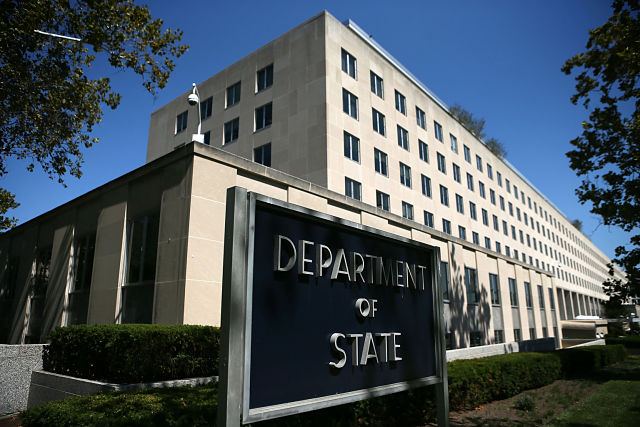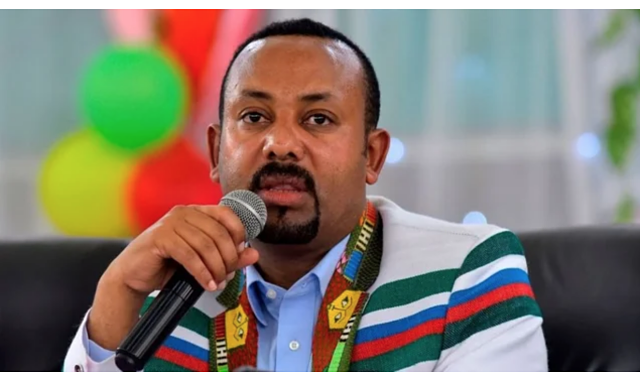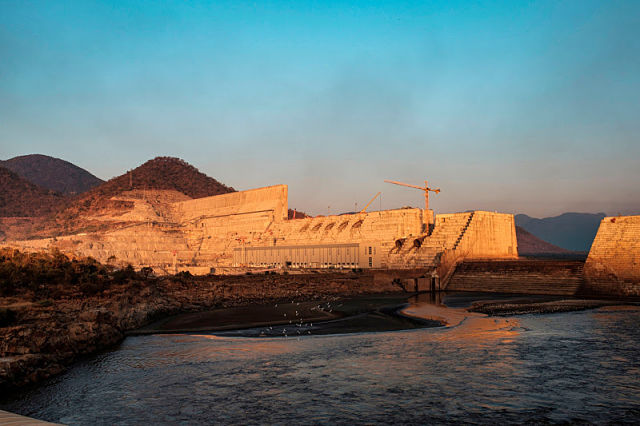 “We have asked for clarification on reports of the United States’ decision not to give the $130 million it assigned to Ethiopia,” Fitsum Arega, Ethiopia’s ambassador to the U.S., said on Twitter. “We have heard that the issue is related to the ongoing negotiations on the Grand Ethiopian Renaissance Dam.” (Getty Images)
“We have asked for clarification on reports of the United States’ decision not to give the $130 million it assigned to Ethiopia,” Fitsum Arega, Ethiopia’s ambassador to the U.S., said on Twitter. “We have heard that the issue is related to the ongoing negotiations on the Grand Ethiopian Renaissance Dam.” (Getty Images)
Bloomberg
By Samuel Gebre
August 31, 2020
Ethiopia asked the U.S. government to clarify reports it may withhold about $130 million of aid in a bid to pressure the Horn of Africa nation to review its plans to fill a new dam that have affronted its neighbors.
“We have asked for clarification on reports of the United States’ decision not to give the $130 million it assigned to Ethiopia,” Fitsum Arega, Ethiopia’s ambassador to the U.S., said on Twitter. “We have heard that the issue is related to the ongoing negotiations on the Grand Ethiopian Renaissance Dam.”
Ethiopia and Egypt are at an impasse over how the dam on a tributary of the Nile River will be managed. Egypt, which depends on the Nile for most of its fresh-water needs, is opposed to any development it says will impact the flow downstream — a position echoed by Sudan. Ethiopia is developing a 6,000-megawatt power plant at the dam, and has asserted a right to use the resource for its development.
As part of its effort to end the impasse, the U.S. is considering cutting aid that could affect security, counter-terrorism and anti-human trafficking programs, Foreign Policy reported Aug.
Egypt, Ethiopia and Sudan on Friday reached a deadlock in tripartite talks about the dam, Sudanese Irrigation Minister Yasser Abas said.
—
Ethiopia seeks US clarification on reported aid cut over dam
The Associated Press
By ELIAS MESERET
August 31, 2020
ADDIS ABABA, Ethiopia (AP) — An Ethiopian diplomat says his country has asked the United States for clarification on a report that Secretary of State Mike Pompeo has approved cutting up to $130 million in aid to Ethiopia because of the country’s dispute with Egypt and Sudan over a massive dam it is building on the Blue Nile.
Fitsum Arega, Ethiopia’s ambassador to the U.S., tweeted Monday saying he has heard the aid cut is related to the Grand Ethiopian Renaissance Dam and that the clarification is expected from the U.S. later Monday. He added that his country is determined to complete the dam, saying that “we will pull Ethiopia out of darkness.”
The planned cut was reported by Foreign Policy late Thursday, setting off an uproar among some in Ethiopia, a regional security ally of the U.S. A State Department spokesperson on Friday said they had no announcements on U.S. assistance “at this time.”
The spokesperson added that “we believe that past work by Egypt, Ethiopia, and Sudan shows it is still possible to reach balanced and equitable agreement in a manner that takes into account the interests of the three countries. … We reaffirm our commitment to remain engaged with the three countries until they reach agreement.”
Africa’s largest hydroelectric dam has caused severe tensions with Egypt, which has called it an existential threat and worries that it will reduce the country’s share of Nile waters. Ethiopia says the $4.6 billion dam will be an engine of development that will pull millions of people out of poverty. Sudan, in the middle, worries about the effects on its own dams though it stands to benefit from access to cheap electricity.
Years of talks among the countries have failed to come to an agreement. Key remaining issues include how to handle releases of water from the dam during multi-year droughts and how to resolve future disputes.
Pope Francis recently urged Egypt, Ethiopia and Sudan to continue talks amid regional concerns that the dispute could lead to military conflict.
The U.S. earlier this year tried to mediate the discussions, but Ethiopia walked away amid accusations that Washington was siding with Egypt. Now the three countries are reporting any progress to the African Union, which is leading negotiations.
The dam’s 74 billion-cubic-meter reservoir saw its first filling in July, which Ethiopia’s government celebrated and attributed to heavy rains. Ethiopia had said it would fill the dam with or without a deal with Egypt and Sudan.
—
Related:
Pompeo approves plans to halt aid to Ethiopia over Nile dam dispute

Getty Images
08/28/20
Secretary of State Mike Pompeo has approved plans to halt some U.S. aid to Ethiopia, Foreign Policy reported on Friday.
The halt in aid comes as the U.S. mediates a dispute over a dam on the Nile River that’s pitted Ethiopia against Egypt and Sudan, according to Foreign Policy. The decision could impact up to $130 million of assistance to programs including security, counter-terrorism and anti-human trafficking.
“There’s still progress being made, we still see a viable path forward here,” a U.S. official told the magazine. “The U.S. role is to do everything it can to help facilitate an agreement between the three countries that balance their interests. At the end of the day it has to be an agreement that works for these three countries.”
The State Department did not immediately respond to a request for comment from The Hill.
Ethiopia and Egypt are at a standstill in negotiations over how the dam on a tributary of the Nile will be managed.
Egypt and Sudan, which depend on the Nile for much of their fresh water, are opposed to any development they say will impact the flow downstream, including the 6,000-megawatt power plant Ethiopia hopes to develop at the dam.
—
Is the Trump Administration Using Aid to Bully Ethiopia Over Nile Dam?

It’s too bad that the U.S. has decided to take the wrong side in a local African dispute regarding the Grand Ethiopian Renaissance Dam. As the following FP article reports the Trump administration is cutting off “some foreign assistance” to Ethiopia over GERD. The scheme may be intended to tip the scale in Egypt’s favor, but if history is any indication this kind of foreign intimidation does not work in Ethiopia. It’s also worth mentioning that the dam, a $4.5 billion hydroelectric project, is being fully funded by the Ethiopian people. (Getty Images)
U.S. Halts Some Foreign Assistance Funding to Ethiopia Over Dam Dispute with Egypt, Sudan, Some U.S. officials fear the move will harm Washington’s relationship with Addis Ababa.
Updated: AUGUST 27, 2020
Secretary of State Mike Pompeo has approved a plan to halt U.S. foreign assistance to Ethiopia as the Trump administration attempts to mediate a dispute with Egypt and Sudan over the East African country’s construction of a massive dam on the Nile River.
The decision, made this week, could affect up to nearly $130 million in U.S. foreign assistance to Ethiopia and fuel new tensions in the relationship between Washington and Addis Ababa as it carries out plans to fill the dam, according to U.S. officials and congressional aides familiar with the matter. Officials cautioned that the details of the cuts are not yet set in stone and the finalized number could amount to less than $130 million.
Programs that are on the chopping block include security assistance, counterterrorism and military education and training, anti-human trafficking programs, and broader development assistance funding, officials and congressional aides said. The cuts would not impact U.S. funding for emergency humanitarian relief, food assistance, or health programs aimed at addressing COVID-19 and HIV/AIDS, officials said.
The move is meant to address the standoff between Ethiopia and other countries that rely on the Nile River downstream that have opposed the construction of the massive dam project, called the Grand Ethiopian Renaissance Dam. Egypt sees the dam’s construction as a core security issue given the country’s heavy reliance on the river for fresh water and agriculture, and in the past Egyptian President Abdel Fattah al-Sisi has hinted his country could use military force to halt the dam’s construction.
Some Ethiopian officials have said they believe the Trump administration is taking Egypt’s side in the dispute. President Donald Trump has shown a fondness for Sisi, reportedly calling him his “favorite dictator” during a G-7 summit last year. Officials familiar with negotiations said the Trump administration has not approved parallel cuts in foreign assistance to Egypt.
Administration officials have repeatedly assured all sides that Washington is an impartial mediator in the negotiations, which mark one of the few diplomatic initiatives in Africa that the president has played a personal and active role in. These officials pointed out that Egypt has accused the United States of taking Ethiopia’s side in the dispute as well.
“There’s still progress being made, we still see a viable path forward here,” said one U.S. official. “The U.S. role is to do everything it can to help facilitate an agreement between the three countries that balance their interests. At the end of the day it has to be an agreement that works for these three countries.”
But the move is likely to face sharp pushback on Capitol Hill, according to Congressional aides familiar with the matter. State Department officials briefed Congressional staff on the decision on Thursday, the aides said, and during the briefing insisted that the U.S.-Ethiopia relationship would remain strong despite a cutback in aid because the United States can have tough conversations “with friends.”
“This is a really fucking illogical way to show a ‘friend’ you really care,” one Congressional aide told Foreign Policy in response.
—
Join the conversation on Twitter and Facebook.

























